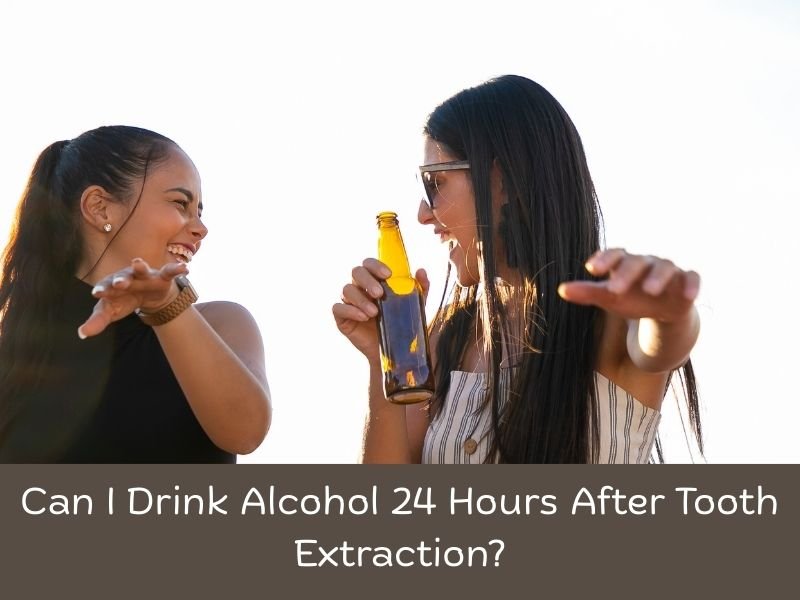“Is it too soon for a toast?” This question often arises after dental procedures, especially tooth extractions. While the idea of unwinding with a drink might be tempting, it’s crucial to understand the implications of alcohol consumption during the healing process.
Tooth extraction, whether due to decay, injury, or orthodontic reasons, is a common dental procedure. Post-operative care plays a vital role in ensuring a smooth and complication-free recovery. Among the various guidelines provided by dental professionals, abstaining from alcohol is frequently emphasised.
But why is alcohol off-limits after tooth extraction? How long should one wait before indulging in a drink? Let’s look into the reasons behind this precaution and the recommended timeline for resuming alcohol consumption.
Table of Contents
ToggleUnderstanding the Healing Process After Tooth Extraction
When a tooth is extracted, the body initiates a healing process to repair the site. This process involves several stages:
- Blood Clot Formation: Immediately after extraction, a blood clot forms in the socket to protect the underlying bone and nerves.
- Tissue Regeneration: Over the next few days, soft tissue begins to grow over the clot, laying the foundation for new bone formation.
- Bone Healing: In the subsequent weeks, the bone remodels and fills the socket, completing the healing process.
Disrupting any of these stages can lead to complications, emphasising the importance of following post-operative care instructions diligently.
Why Alcohol Should Be Avoided Post-Extraction
Consuming alcohol shortly after a tooth extraction can interfere with the healing process in several ways:
Risk of Dry Socket
Dry socket, or alveolar osteitis, occurs when the protective blood clot is dislodged or fails to form properly, exposing the underlying bone and nerves. This condition can cause severe pain and delay healing. Alcohol’s anticoagulant properties can prevent proper clot formation, increasing the risk of dry socket.
Delayed Healing
Alcohol can impair the body’s natural healing mechanisms. It can reduce the proliferation of cells essential for tissue regeneration and compromise the immune response, making the extraction site more susceptible to infections.
Increased Bleeding
As a vasodilator, alcohol can widen blood vessels, leading to increased blood flow and potential bleeding at the extraction site. This can disrupt the formation of a stable blood clot, essential for healing.
Interaction with Medications
Post-extraction, dentists often prescribe pain relievers or antibiotics. Mixing these medications with alcohol can lead to adverse reactions, including dizziness, gastrointestinal issues, or reduced efficacy of the drugs.
Dehydration and Immune Suppression
Alcohol is a diuretic, leading to increased urine production and potential dehydration. Adequate hydration is crucial for healing, and dehydration can hinder the process. Moreover, alcohol can suppress the immune system, making it harder for the body to fend off potential infections at the extraction site.
Recommended Timeline for Resuming Alcohol Consumption
Dental professionals generally advise patients to abstain from alcohol for at least 24 to 72 hours post-extraction. However, the exact duration can vary based on individual circumstances:
- Simple Extractions: For straightforward tooth removals, waiting 3 to 5 days before consuming alcohol is often sufficient.
- Surgical Extractions: Procedures involving impacted teeth or surgical interventions may require a longer abstinence period, typically 7 to 10 days.
It’s essential to consult with your dentist or oral surgeon for personalised advice, as they can provide guidance based on the specifics of your procedure and overall health.
Safe Alternatives to Alcohol During Recovery
Craving a glass of wine or your favourite cocktail after an extraction is understandable, especially if you’re trying to relax. However, your body will thank you for choosing safer, healing-friendly alternatives in the meantime.
Hydration Is Key
Water is your best friend during recovery. Not only does it keep your body hydrated, but it also helps flush out toxins, supports tissue repair, and maintains a healthy environment in your mouth.
You can also try:
- Herbal teas: Chamomile or peppermint tea can soothe discomfort and reduce inflammation. Just be sure it’s not too hot, which could irritate the healing site.
- Electrolyte drinks: Low-sugar electrolyte beverages can replenish essential minerals if you’re feeling low-energy or dehydrated.
Nutrient-Rich Smoothies
Smoothies are a great option, as long as they’re seedless and consumed with a spoon, not a straw (to avoid dislodging the clot). Opt for:
- Banana, mango, and yoghurt blends for natural probiotics and potassium.
- Blended oats, almond milk, and blueberries for energy and antioxidants.
- Protein smoothies if you’re struggling to meet your nutritional needs post-extraction.
Non-Alcoholic Beverages That Feel Special
If it’s the ritual of “having a drink” that you miss, try non-alcoholic alternatives:
- Sparkling water with lemon or cucumber.
- Alcohol-free beer or wine (make sure it’s sugar-free and not too acidic).
- Mocktails are made with fresh herbs, fruit juice, and soda water.
Keeping your body nourished and hydrated lays the groundwork for a smoother, faster recovery, without the risks that alcohol brings.
Tips for Optimal Recovery Post-Tooth Extraction
Beyond just avoiding alcohol, there are several essential practices you can follow to ensure a smooth and complication-free recovery.
Stick to a Soft Food Diet
Chewing hard, crunchy, or sticky foods can interfere with clot formation and healing. For the first few days:
- Choose mashed potatoes, yoghurt, scrambled eggs, applesauce, and soup (cooled down).
- Avoid spicy, acidic, or extremely hot foods that might irritate the wound.
Skip the Straw
Using a straw can create suction in your mouth, which may dislodge the healing clot and lead to dry socket. Stick to sipping from a cup.
Don’t Smoke
Smoking delays healing, increases the risk of dry socket, and introduces harmful bacteria to the wound. If you smoke, try to refrain for at least 72 hours post-procedure, though quitting altogether would be even better for your oral health.
Maintain Gentle Oral Hygiene
Keeping your mouth clean is essential to prevent infection, but it must be done carefully:
- Avoid brushing near the extraction site for the first 24 hours.
- Rinse gently with warm salt water starting on the second day (½ teaspoon salt in 1 cup water).
- Avoid commercial mouthwashes that contain alcohol.
Rest and Elevate Your Head
Physical exertion can increase blood pressure and cause bleeding at the site. Take it easy for a few days and keep your head elevated while sleeping to minimise swelling.
Monitor for Complications
Watch out for:
- Severe or increasing pain after 2-3 days
- Excessive bleeding that doesn’t stop
- Foul taste or smell in your mouth
- Swelling that worsens instead of improves
If any of these occur, contact your dentist immediately.
For more post-extraction care tips, the Cleveland Clinic provides a helpful overview that aligns with best dental practices.
Conclusion
So, can you drink alcohol 24 hours after a tooth extraction? The short answer is no. While one day might feel like a sufficient recovery period, it’s not nearly enough for your body to safely process alcohol without risking complications.
From dry socket to delayed healing and medication interactions, the risks of drinking too soon outweigh the brief satisfaction of a cocktail. Dentists and oral surgeons generally recommend waiting at least 3 to 7 days—and in many cases up to 10 days—before consuming alcohol again.
Your mouth is going through a significant healing process, and giving it the time and care it needs ensures not only a smooth recovery but also prevents painful (and sometimes costly) complications.
In the meantime, hydrate well, enjoy soothing non-alcoholic alternatives, and follow your dentist’s instructions. Before you know it, you’ll be fully healed and ready for a proper, guilt-free toast.
And remember: when in doubt, consult your dental professional. They know your case best and can give you personalised guidance.
For further reading on the effects of alcohol on wound healing, check out this detailed resource from the National Institutes of Health (NIH).

